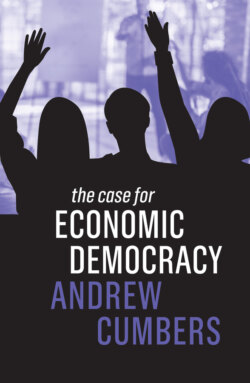Читать книгу The Case for Economic Democracy - Andrew Cumbers - Страница 8
The economic roots of the democratic crisis
ОглавлениеThe re-emergence of an authoritarian, xenophobic and fundamentally anti-democratic right-wing politics, symbolized by Donald Trump’s US Presidency, is one of the key features of our time. On every continent, the retreat from universal human rights, international solidarity, respect for minorities, a tolerance of migrants and refugees and a commitment to shared solutions to global problems is a disturbing reality. As I write (in July 2019), a striking fact is that none of the world’s ten most populated countries, which includes ‘nominal’ democracies such as Brazil, Russia, India and the United States, is listed by the Economist Intelligence Unit (EIU) as a ‘Full Democracy’ in its 2018 Democracy Index, which measures among other things, the commitment to pluralism, civil liberties and political culture. The EIU has noted ‘a broad-based deterioration in the practice of democracy in recent years’ (EIU 2017: 3).
Among many liberal academic and political commentators, there seems general agreement on what the problem is: a growing chasm between global elites and an increasingly disaffected populace, in part characterized as a ‘deepening divide between people and experts’ as the EIU puts it. The rejection of the existing political system leads to support for faux ‘outsiders’ – those members of the economic elite, like Trump, who can successfully position themselves to appeal to underlying nationalist and racist tropes among key voter groups, especially those ‘left behind’ by economic globalization.
While the crisis of democracy is now a central trope of mainstream commentary, there is seldom much discussion of the underlying economic system of global capitalism, which I would argue is the root cause of this malaise. The democratic crisis is usually talked of as a separate event to the almost four decades of rapacious wealth and income accumulation by global elites alongside stagnant real wage growth amongst workers and the decline of regular jobs capable of providing a decent income to afford basic necessities for many people on the planet. The threat to regular low-skilled and even more skilled, but routine, work by automation in the future threatens to deepen this jobs crisis, adding more grist to the mill of right-wing populists. The collapse of well-paid and unionized industrial jobs in Europe and North America, and the shift of work to China and other parts of the Global South, has fuelled a reaction against globalization, or at least its neoliberal free trade form, which right-wing autocrats, rather than a more progressive left, have capitalized on. A slide into a dark Fascistic politics reminiscent of the 1930s is not far away unless we are able to fashion a very different kind of economy to the one we have now.
Not only is there little sense of the economic fundamentals, but there is seldom much introspection among the liberal establishment on their own role in fashioning the current democratic crisis. While acknowledging that political elites have neglected the ‘white working class’, a rather simplistic and racist trope in itself, there is little critical reflection on the existing economic order that underpins this sense of disconnect. When genuinely radical popular policies such as more progressive tax regimes, dramatically raising minimum wages, a Green New Deal, or creating democratic public ownership are mooted, they continue to be derided or ignored by the liberal political establishment and its shrinking support base.1 There is still a commitment not to interfere with ‘business as usual’.
The roots of this liberal democratic crisis go back to the 1990s and the centre left’s embrace of economic policies that largely served global business interests. While Margaret Thatcher famously announced in 1981 that ‘there is no alternative’ to business-friendly, market-driven economic policies, it is the acceptance of her creed by the governments of Blair, Clinton, Schroeder, Jospin and other supposed progressives that have arguably contributed as much to our current impasse. The centre left’s headlong embrace of economic deregulation, privatization and marketization, now collectively described as neoliberalism, and the retreat from a traditional concern with social justice and income redistribution, leave many lower income groups bereft of political power and support. The argument made then was that, in the face of globalization, old left policies no longer worked because business would go elsewhere if threatened; though like many compelling ‘common sense’ narratives, there is little ‘real-world’ evidence to back this up.2 Instead, the centre left told us, progressives should provide a favourable environment to attract business which would lead to more tax revenues that could then be spent on public services. The financial crisis was the end game of this laissez-faire equivocation, though many still seem dangerously unaware of this.
